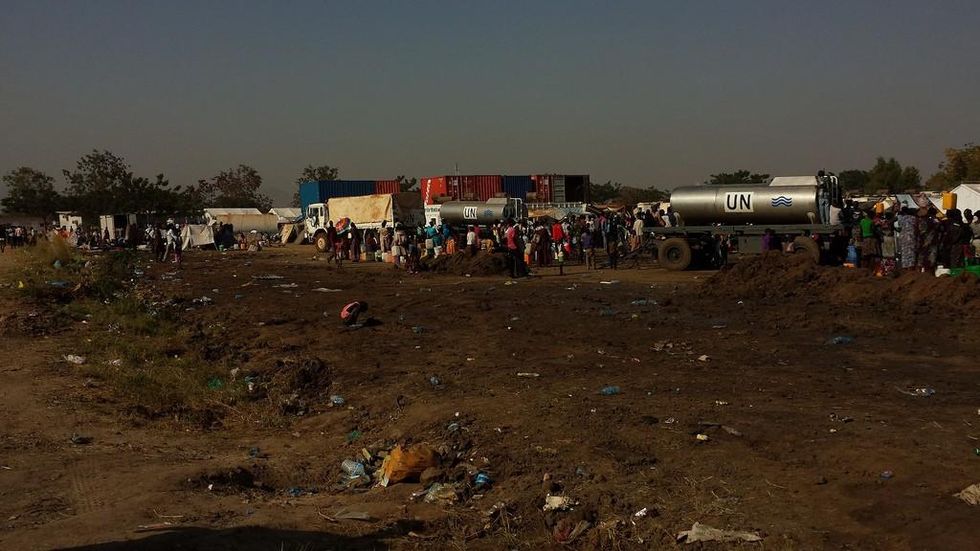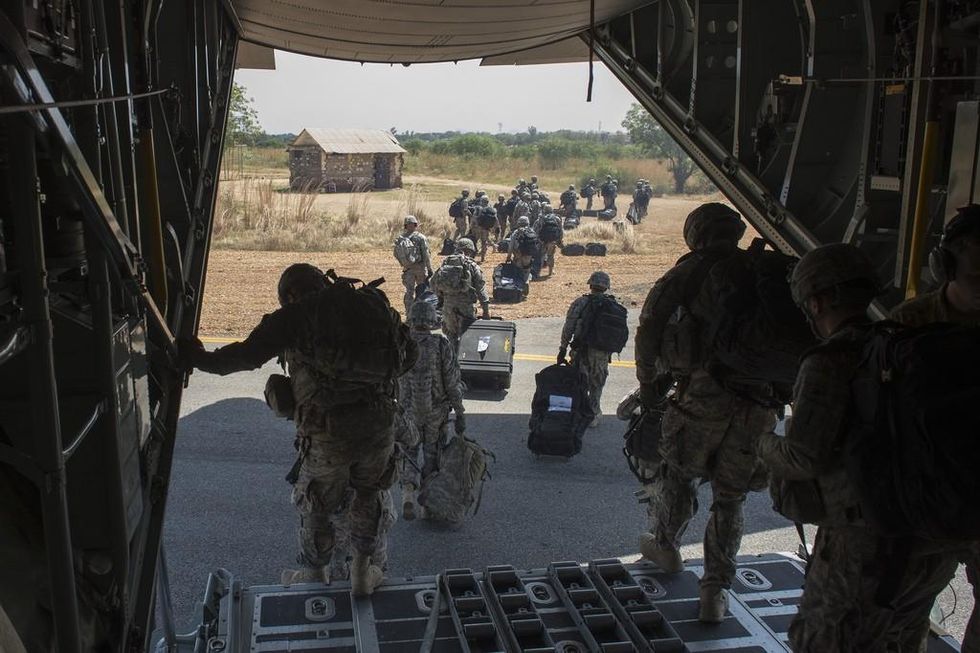

SUBSCRIBE TO OUR FREE NEWSLETTER
Daily news & progressive opinion—funded by the people, not the corporations—delivered straight to your inbox.
5
#000000
#FFFFFF
To donate by check, phone, or other method, see our More Ways to Give page.


Daily news & progressive opinion—funded by the people, not the corporations—delivered straight to your inbox.

The newest wave of violence erupted in oil-rich South Sudan, an independent nation since 2011, on Dec. 15, when, as the Guardian reported,
South Sudan's president, Salva Kiir, has accused his former deputy Riek Machar of attempting to launch a coup [...] The pair, who have been rivals since the long civil war that ended in 2005 and split the country, had been in an uneasy power-sharing government since independence in 2011.
Kiir hails from the Dinka community, while Machar comes from the Nuer. The accusation that the former vice-president had attempted to seize power led to widespread reprisals against his supporters and fellow Nuer in the capital and surrounding areas. What began as a political power struggle has spilled over into open ethnic conflict in some areas.
The BBC's South Sudan analyst James Copnall cautions against painting the conflict as simply one of ethnic divisions:
The growing number of allegations of ethnically motivated killings are deeply concerning. It's important to remember that this crisis is at its heart a political struggle, in a militarized, and, yes, ethnically divided society.
The strength of politicians often comes from their ethnic base, so the power struggle is exacerbating ethnic cleavages.
It is wrong to paint this as an "ethnic war", though - it is far more complicated than this. It is also unclear to what extent the military commanders can control the many armed civilians fighting in different parts of the country.

"Mass extrajudicial killings, the targeting of individuals on the basis of their ethnicity and arbitrary detentions have been documented in recent days," Pillay said. "We have discovered a mass grave in Bentiu, in Unity State, and there are reportedly at least two other mass graves in Juba."
"There is a palpable fear among civilians of both Dinka and Nuer backgrounds that they will be killed on the basis of their ethnicity," Pillay added. "There need to be clear statements and clear steps from all those in positions of political and military control that human rights violations will not be tolerated and those responsible will be brought to justice."
The European Union's foreign policy chief, Catherine Ashton expressed concern over the violence as well. "I am extremely concerned that South Sudan risks spiraling into a disaster for both its own people and the region," she said on Tuesday. "Such a situation can, and must, be avoided."
U.S. military forces are ready to intervene, with 150 Marines now in Djibouti, according to Africa Command.
"By positioning these forces forward, we are able to more quickly respond to crisis in the region, if required," said the Africa Command.
"One of the lessons learned from the tragic events in Benghazi [Libya] was that we needed to be better postured, in order to respond to developing or crisis situations, if needed. These precautionary movements will allow us to do just that," it said.
U.S. military aircraft has already been under attack in South Sudan while carrying out an evacuation mission.
While foreign nationals have been evacuated, tens of thousands Dink and Nuer have been forced to flee, displaced within their own country. 51-year-old Peter Bey, a Nuer, has watched foreign nationals escape to safety as he, and many others, seek shelter at a UN mission base in Juba.
"We see from history that the UN has left people behind before in Rwanda," Bey said. "They put their own people on helicopters and left the people who died."
___________________
Dear Common Dreams reader, The U.S. is on a fast track to authoritarianism like nothing I've ever seen. Meanwhile, corporate news outlets are utterly capitulating to Trump, twisting their coverage to avoid drawing his ire while lining up to stuff cash in his pockets. That's why I believe that Common Dreams is doing the best and most consequential reporting that we've ever done. Our small but mighty team is a progressive reporting powerhouse, covering the news every day that the corporate media never will. Our mission has always been simple: To inform. To inspire. And to ignite change for the common good. Now here's the key piece that I want all our readers to understand: None of this would be possible without your financial support. That's not just some fundraising cliche. It's the absolute and literal truth. We don't accept corporate advertising and never will. We don't have a paywall because we don't think people should be blocked from critical news based on their ability to pay. Everything we do is funded by the donations of readers like you. Will you donate now to help power the nonprofit, independent reporting of Common Dreams? Thank you for being a vital member of our community. Together, we can keep independent journalism alive when it’s needed most. - Craig Brown, Co-founder |

The newest wave of violence erupted in oil-rich South Sudan, an independent nation since 2011, on Dec. 15, when, as the Guardian reported,
South Sudan's president, Salva Kiir, has accused his former deputy Riek Machar of attempting to launch a coup [...] The pair, who have been rivals since the long civil war that ended in 2005 and split the country, had been in an uneasy power-sharing government since independence in 2011.
Kiir hails from the Dinka community, while Machar comes from the Nuer. The accusation that the former vice-president had attempted to seize power led to widespread reprisals against his supporters and fellow Nuer in the capital and surrounding areas. What began as a political power struggle has spilled over into open ethnic conflict in some areas.
The BBC's South Sudan analyst James Copnall cautions against painting the conflict as simply one of ethnic divisions:
The growing number of allegations of ethnically motivated killings are deeply concerning. It's important to remember that this crisis is at its heart a political struggle, in a militarized, and, yes, ethnically divided society.
The strength of politicians often comes from their ethnic base, so the power struggle is exacerbating ethnic cleavages.
It is wrong to paint this as an "ethnic war", though - it is far more complicated than this. It is also unclear to what extent the military commanders can control the many armed civilians fighting in different parts of the country.

"Mass extrajudicial killings, the targeting of individuals on the basis of their ethnicity and arbitrary detentions have been documented in recent days," Pillay said. "We have discovered a mass grave in Bentiu, in Unity State, and there are reportedly at least two other mass graves in Juba."
"There is a palpable fear among civilians of both Dinka and Nuer backgrounds that they will be killed on the basis of their ethnicity," Pillay added. "There need to be clear statements and clear steps from all those in positions of political and military control that human rights violations will not be tolerated and those responsible will be brought to justice."
The European Union's foreign policy chief, Catherine Ashton expressed concern over the violence as well. "I am extremely concerned that South Sudan risks spiraling into a disaster for both its own people and the region," she said on Tuesday. "Such a situation can, and must, be avoided."
U.S. military forces are ready to intervene, with 150 Marines now in Djibouti, according to Africa Command.
"By positioning these forces forward, we are able to more quickly respond to crisis in the region, if required," said the Africa Command.
"One of the lessons learned from the tragic events in Benghazi [Libya] was that we needed to be better postured, in order to respond to developing or crisis situations, if needed. These precautionary movements will allow us to do just that," it said.
U.S. military aircraft has already been under attack in South Sudan while carrying out an evacuation mission.
While foreign nationals have been evacuated, tens of thousands Dink and Nuer have been forced to flee, displaced within their own country. 51-year-old Peter Bey, a Nuer, has watched foreign nationals escape to safety as he, and many others, seek shelter at a UN mission base in Juba.
"We see from history that the UN has left people behind before in Rwanda," Bey said. "They put their own people on helicopters and left the people who died."
___________________

The newest wave of violence erupted in oil-rich South Sudan, an independent nation since 2011, on Dec. 15, when, as the Guardian reported,
South Sudan's president, Salva Kiir, has accused his former deputy Riek Machar of attempting to launch a coup [...] The pair, who have been rivals since the long civil war that ended in 2005 and split the country, had been in an uneasy power-sharing government since independence in 2011.
Kiir hails from the Dinka community, while Machar comes from the Nuer. The accusation that the former vice-president had attempted to seize power led to widespread reprisals against his supporters and fellow Nuer in the capital and surrounding areas. What began as a political power struggle has spilled over into open ethnic conflict in some areas.
The BBC's South Sudan analyst James Copnall cautions against painting the conflict as simply one of ethnic divisions:
The growing number of allegations of ethnically motivated killings are deeply concerning. It's important to remember that this crisis is at its heart a political struggle, in a militarized, and, yes, ethnically divided society.
The strength of politicians often comes from their ethnic base, so the power struggle is exacerbating ethnic cleavages.
It is wrong to paint this as an "ethnic war", though - it is far more complicated than this. It is also unclear to what extent the military commanders can control the many armed civilians fighting in different parts of the country.

"Mass extrajudicial killings, the targeting of individuals on the basis of their ethnicity and arbitrary detentions have been documented in recent days," Pillay said. "We have discovered a mass grave in Bentiu, in Unity State, and there are reportedly at least two other mass graves in Juba."
"There is a palpable fear among civilians of both Dinka and Nuer backgrounds that they will be killed on the basis of their ethnicity," Pillay added. "There need to be clear statements and clear steps from all those in positions of political and military control that human rights violations will not be tolerated and those responsible will be brought to justice."
The European Union's foreign policy chief, Catherine Ashton expressed concern over the violence as well. "I am extremely concerned that South Sudan risks spiraling into a disaster for both its own people and the region," she said on Tuesday. "Such a situation can, and must, be avoided."
U.S. military forces are ready to intervene, with 150 Marines now in Djibouti, according to Africa Command.
"By positioning these forces forward, we are able to more quickly respond to crisis in the region, if required," said the Africa Command.
"One of the lessons learned from the tragic events in Benghazi [Libya] was that we needed to be better postured, in order to respond to developing or crisis situations, if needed. These precautionary movements will allow us to do just that," it said.
U.S. military aircraft has already been under attack in South Sudan while carrying out an evacuation mission.
While foreign nationals have been evacuated, tens of thousands Dink and Nuer have been forced to flee, displaced within their own country. 51-year-old Peter Bey, a Nuer, has watched foreign nationals escape to safety as he, and many others, seek shelter at a UN mission base in Juba.
"We see from history that the UN has left people behind before in Rwanda," Bey said. "They put their own people on helicopters and left the people who died."
___________________